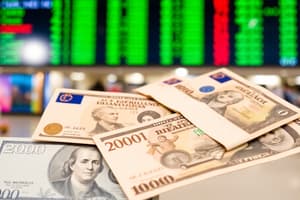Podcast
Questions and Answers
What is the main reason for different buying and selling rates quoted by money dealers?
What is the main reason for different buying and selling rates quoted by money dealers?
- To compensate for the additional time and cost of clearing documents
- To incentivize traders to use a particular payment method
- To incorporate an allowance for the dealer's margin or profit (correct)
- To reflect the difference in security, storage, and transportation costs for cash and electronic transfers
What is characteristic of a free-floating exchange rate regime?
What is characteristic of a free-floating exchange rate regime?
- The government sets a fixed exchange rate
- The exchange rate is allowed to vary against other currencies based on market forces (correct)
- The exchange rate is pegged to a basket of currencies
- The exchange rate is fixed and never changes
What was the system of fixed exchange rates that was in place between Western European countries and the US dollar from the end of World War II until 1967?
What was the system of fixed exchange rates that was in place between Western European countries and the US dollar from the end of World War II until 1967?
- The free-floating regime
- The movable peg system
- The Nixon Shock system
- The Bretton Woods system (correct)
Why do money dealers offer different rates for cash and documentary transactions?
Why do money dealers offer different rates for cash and documentary transactions?
What happened in 1967 that led to the abandonment of the Bretton Woods system?
What happened in 1967 that led to the abandonment of the Bretton Woods system?
What is the basic exchange rate based on?
What is the basic exchange rate based on?
What is the purpose of the basic exchange rate?
What is the purpose of the basic exchange rate?
What is the cross exchange rate based on?
What is the cross exchange rate based on?
What is the characteristic of a fixed exchange rate?
What is the characteristic of a fixed exchange rate?
What is the market exchange rate affected by?
What is the market exchange rate affected by?
Flashcards are hidden until you start studying
Study Notes
Exchange Rates
- Exchange rate is the price of one currency in terms of another, equivalent to the foreign currency that can be obtained from a unit of home currency.
- In economics, exchange rates are reported in terms of home currency per foreign currency (e.g., Naira per foreign currency).
- For example, N350 Nigerian Naira is equivalent to 1 US Dollar.
- Exchange rates can be quoted in European terms, i.e., 1/350 = 0.0077 N/$.
- Exchange rates can result in gains or losses for organizations that receive and/or make payments in foreign currencies.
Exchange Rate Determination
- Exchange rates can be determined by the foreign exchange market, which is open to various types of buyers and sellers and operates continuously.
- In a floating exchange rate regime, exchange rates are determined by market forces of supply and demand.
- Countries can impose limits and controls on exchange rates, and governments can choose to have a floating, pegged, or hybrid exchange rate regime.
Types of Exchange Rates
- Spot exchange rate is the current exchange rate.
- Forward exchange rate is an exchange rate quoted and traded today but for delivery and payment on a specific future date.
- Buying rate is the rate at which money dealers will buy foreign currency.
- Selling rate is the rate at which money dealers will sell that currency.
- Quoted rates may incorporate an allowance for a dealer's margin or profit.
Exchange Rate Regimes
- Countries can choose from three main types of exchange rate regimes: free-floating, pegged (fixed), or a hybrid.
- Free-floating regimes allow exchange rates to vary according to market forces.
- Pegged regimes involve fixed exchange rates, but with provisions for revaluation (usually devaluation) of a currency.
- Hybrid regimes combine elements of free-floating and pegged regimes.
Exchange Rate Classification
- Buying rate: The price used by banks to buy foreign currency from customers, where a smaller amount of domestic currency is required to buy a certain amount of foreign exchange.
Bank Foreign Exchange Trading
- Selling rate: The price used by banks to sell foreign exchange to customers, indicating how much domestic currency is required to recover a certain amount of foreign exchange.
- Middle rate: The average of the bid and ask prices, commonly used in newspapers, magazines, and economic analysis.
Delivery-Based Classification
- Spot exchange rate: The exchange rate for spot foreign exchange transactions, delivered within two working days, and generally listed on the foreign exchange market.
- Forward exchange rate: An agreed-upon exchange rate for a certain period in the future, with a premium, discount, or parity based on the spot exchange rate.
Exchange Rate Setting
- Basic rate: The exchange rate based on a key convertible currency, usually a world currency, which is widely used for pricing, settlement, and reserve currency.
- Cross rate: The exchange rate calculated through the basic exchange rate, resulting in the exchange rate of the local currency against other foreign currencies.
Payment Method-Based Classification
- Telegraphic exchange rate
- Mail transfer rate
- Demand draft rate
Foreign Exchange Control-Based Classification
- Official rate: The exchange rate announced by a country's foreign exchange administration, usually used by countries with strict foreign exchange controls.
- Market rate: The real exchange rate for trading foreign exchange in the free market, fluctuating with changes in supply and demand conditions.
International Exchange Rate Regime
- Fixed exchange rate: A fixed exchange rate between a country's currency and another country's currency, with minimal fluctuations.
- Floating exchange rate: A regime where the monetary authorities do not stipulate the official exchange rate, allowing for fluctuations without upper or lower limits.
Studying That Suits You
Use AI to generate personalized quizzes and flashcards to suit your learning preferences.




